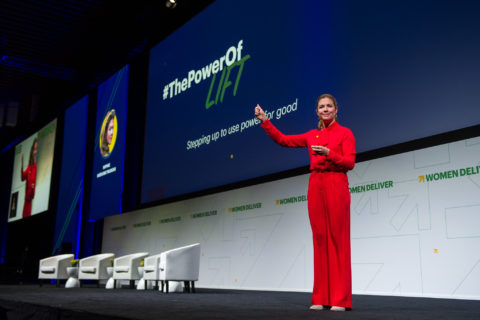Sophie Trudeau, Gender Stats, and Other Highlights from Day 2 of Women Deliver
Did you know that worldwide, only 20% of agricultural land is held by women?
A conference with 8000 attendees from around the world, a schedule that kicks off as early as 6am, and panel discussions on sensitive subjects like sexual violence, pay inequity and workplace harassment can be overwhelming. It can also be an incredible place to learn. At Women Deliver, the world’s largest conference on gender equality, held in Vancouver this week, there was no shortage of facts, figures and data to drive home the depth of the inequities faced by women, and how they’re holding not just women but everyone back.
Here are some of the eye-opening facts shared at Women Deliver by activists and policy makers:
1. Countries could add $12 trillion to the global GDP by 2025 by advancing women’s equality, according to a McKinsey report.
2. Worldwide, only 20% of agricultural land is held by women.
3. Every two seconds, a child somewhere in the world is forced into marriage.
4. In 2015, all United Nations member states adopted 17 Sustainable Development Goals (SDGs) to achieve by 2030 in areas such as education, climate, and gender equality. A progress report released this week shows that not a single country in the world is on track to achieve its goals for gender equality by 2030.
5. For every year of secondary school a girl receives, her future earnings go up by 10-20%.
Read on for some other takeaways from the day’s events, including this quip from Sophie Gregoire Trudeau: “For those who know me already, you know I like to keep things real and for those who don’t, you’ll see it right away. By this time with what my husband does as a job—prime minister—the whole world knows that he’s a feminist. But let’s keep it real and let’s make it clear. He married a feminist, who made sure she married a feminist. Thank you!”
1. Getting men actively involved with the fight for gender equality is imperative
At a panel on post-#MeToo work environments, the most thought-provoking statements came from the sole male on the panel: Wade Davis. The NFL player turned feminist gender consultant brought a valuable perspective to the discussion that’s often missing when we talk about the pathway to equality, without which success is impossible. We need men in the fight with us, to meet us halfway. One of the things men need to do, says Davis, is stop thinking of themselves as allies. “We have to push men to not see ourselves as allies to women but actually as standing in solidarity with them. Because when we create a world that’s more equal and equitable, men benefit too. But the idea of being an ally means we’re doing it FOR you.”
According to Davis, the necessary re-education of men, who have been conditioned to view women as objects, involves real emotional labour (which is where he comes in as an educator and consultant on issues of gender and power). “How do we push men to own the fact that some part of us has been complicit in what you all are experiencing? Whether we’ve been an actor, and most of us have, or whether we’ve been complicit in our silence, and most of us have. But to own that is really, really hard and takes a lot of emotional labour, which we haven’t been taught to do.” Nonetheless, he’s confident it can be done.
2. Language plays a vital role in the healing of trauma
For the past few days, there has been much debate over whether the MMIWG National Inquiry’s conclusion that the murder and disappearance of thousands of indigenous women and girls amounts to genocide. On multiple occasions during Women Deliver, Justin Trudeau reiterated that he “accepts” these findings, while at the same time avoiding making any explicit statements about his own personal views on the ‘genocide’ categorization. Nonetheless, the fact that he publicly accepts the inquiry’s findings means a great deal to the indigenous community. At a panel yesterday, Lynne Groulx, CEO of the Native Women’s Association of Canada, said: “It’s an important step for reconciliation. We cannot fix what we don’t acknowledge.”
Further on the topic of the categorization of the crimes against indigenous women and girls as genocide, Chief Commissioner of the MMIWG National Inquiry, Marion Buller adds, “It’s not the type of genocide one associates with the Holocaust or Rwanda or other mass killings, but a genocide created by generations of governments that deliberately underfunded education, health services and housing, forcibly removed children from their families and their communities and often those children were never seen again… This genocide also means generations during which governments permitted sterilizations of women without their consent and sometimes without their knowledge, generations of governments that forcibly removed entire communities from their land, their heart, their heartbeat, and relocated them in entirely unknown foreign territories for expedience and for convenience. In other words this is generations of governments forcing indigenous women and girls and 2-S people into harm’s way, into poverty, into risk, into murder, abduction, rape, assault. This genocide stemming from colonization, racism and misogyny is the reality of our past here in Canada and it is still the reality of our present.”
3. Sports can be a tool for empowerment
Pakistani squash player Maria Toorpakai Wazir fled her hometown of South Waziristan in Pakistan due to death threats from the Taliban merely for being a female athlete. She has called Canada home since 2011, but her dream to empower young girls and boys in Pakistan through sports lives on. “The area where I grew up is affected by terrorism because it is full of weapons,” Wazir said on a panel moderated by Sophie Gregoire Trudeau. “I wish [the youth] was given sports and books instead of guns and drugs because if they had we would have different people out there… We see countries spending 80% of their GDP on defence. We don’t need your defence, we don’t need to spend money on nuclear weapons. Spend those funds on women, on sports and on education. That’s the protection that will make you safer, not weapons.”








